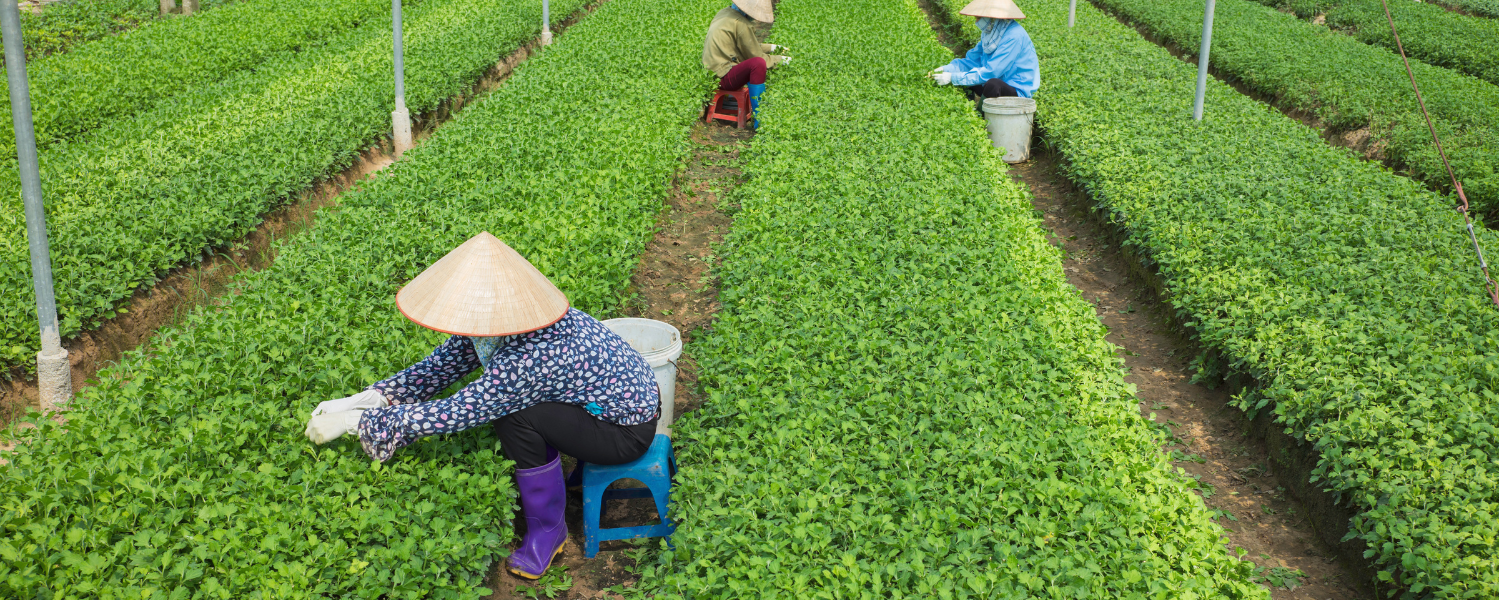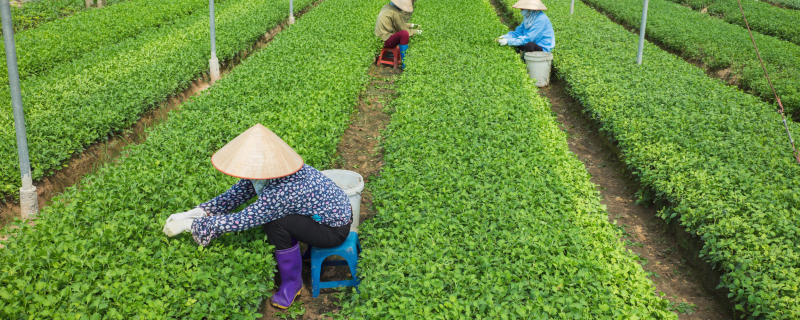
Building a chain of production and consumption of agricultural and food products between Ho Chi Minh City and the Provinces of the Southern Key Economic Region (Part 2)
After analyzing the current status of organizing agricultural and food production that meets safety standards and the difficult and outstanding problems in the southern key economic region in Part 1, the author of University of Economics Ho Chi Minh City (UEH) has researched and proposed management policies and solutions so as to build a chain of safe production and consumption of agricultural products, increasing supply and stabilizing the market in Provinces and Cities in the Region.

The needs towards the conditions in terms of consuming agricultural products in the direction of food safety
*Scientific and practical foundation
When the market creates negative externalities and market failures, the State has the role in adjusting and overcoming these problems through policies and interventions. In the field of agricultural and food production and consumption, the current problem is that both the market and state management institutions have defects. Some important shortcomings can be pointed out as follows: 1) Information asymmetry between producers and consumers takes place to the disadvantage of consumers when they are uncertain regarding the food safety level of agricultural products that they consume; 2) Low-income consumers have absolutely no opportunity to choose safe food from the traditional distribution channels; 3) Producers cause negative externalities (production does not ensure food safety) and the society must face losses through environmental and health damage; 4) The legal system on food safety is not strict enough to force producers to comply; 5) Production practices that do not ensure food safety have not been appropriately punished.
The economic principles allow suggesting a scientific foundation for public sector interventions as follows: 1) The impact of adjusting the behavior of producers and consumers through policies to limit negative externalities of the public sector. Production, processing, circulation, and distribution acts that do not comply with food safety regulations; 2) Creating mechanisms to encourage beneficial behaviors through funding vulnerable people in the early stages; 3) Creating a mechanism to encourage forced integration to form vertical and horizontal linkages to gradually change non-integrated production behavior; 4) Enforcing necessary sanctions to ensure compliance.
In reality, up to the present time, agricultural and agricultural trade policies have often been approached from the ‘SUPPLY’ party. The proposed policies and solutions require reorganizing production and mobilizing farmers to produce in accordance with VietGAP standards and meet food safety standards; investment in agricultural extension work, etc. It is necessary to change the way of approaching the problem from the ‘DEMAND’ party. Policies need to focus on building mandatory product standards when put into circulation and distribution on the market. Only goods that meet VietGAP standards and food safety standards can be put into circulation and distribution on the market. In other words, the first thing is to establish mandatory technical fence standards. This approach considers the role of the market from the demand side as a prerequisite and the guide for production from the supply side.
*Policy access
The proposed policy approach follows the consistent principle as follows: “production must be safe; if it is not safe, do not produce”. Do not accept double standards in the production, processing and consumption of agricultural and food products. In other words, the food safety legal system must be mandatory and should not use an advocacy or incentive approach.
Approaching policies from the demand side is to focus on building mandatory product standards when put into circulation and distribution on the market. Only goods that meet standards (for example, VietGAP standards, biosafety regulations) can be put into circulation and distribution on the market. In other words, the first thing is to establish mandatory technical fence standards.
All households, production establishments, cooperatives, and enterprises that produce, transport, process, and consume agricultural and food products are required to apply national regulations and standards to achieve satisfactory production. Mandatory standards of the City market combined with mandatory application of product traceability from production facilities, farms, agricultural enterprises and farming households.
Recommended Policies
*Policy recommendations at State and Ministry levels
Recommendation 1: Researching and applying an integrated food safety management model at the national level
The Government researches and evaluates a unified model of food safety management through a pilot model of the Food Safety Management Board in Ho Chi Minh City towards proposing policies to maintain or to develop this unified model at the Provinces, Cities and Regional levels. This consolidated model has the advantage of meeting the need for centralized management at one focal point of the government and local authorities, centralizing management throughout the entire agricultural and food supply chain, avoiding segmented fragmentation and division in terms of industry and field.
Recommendation 2: The Government researches to legalize the food safety control mechanism at the Regional level and to build a Regional State food safety management institution.
Regional-level institutions have not been regulated at administrative decentralization yet. However, it is being possible to decentralize food safety coordination and management at the regional level between localities that need to voluntarily link together. Moreover, it is possible to establish a system of Regional food safety management agencies in accordance with a unified model for food safety management. The Regional linkage mechanism for food safety management allows supply chain management from upstream to downstream, unifying management mechanisms and supply chain control measures, ensuring traceability and meeting requirements related to area planning, uniformly applying standards and supporting measures as well as organizing production, preliminary processing, processing, transportation, storage and distribution of safe products to consumers.
Recommendation 3: Unifying agricultural and food production standards and enforcing them in accordance with the roadmap
The Ministry of Agriculture and Rural Development and the Ministry of Science and Technology research and unify VietGAP standards with Biosafety Production Standards that are applicable to the cultivation, livestock, fisheries and processing industries as a foundation for establishing market standards, ensuring traceability and moving towards mandatory application throughout the country in accordance with an appropriate roadmap.
Recommendation 4: Strictly managing the production, the trade and the use of agricultural and food chemicals
The Ministry of Agriculture and Rural Development strengthens strict management of licensing for circulation and consumption of agricultural chemical products, strictly manages the use of banned substances in the production and processing of agricultural products, and updates regularly lists chemicals banned from use in agricultural production. The Ministry of Industry and Trade strengthens strict inspection and enforces sanctions against counterfeit production and violations of announced product standards. Once the production, trade and use of agricultural and food chemicals are strictly controlled, the use of harmful agricultural chemicals will be minimized from the supply, leading to the creation of favorable conditions which is easier for food safety management from the demand side.
*Recommend Regional level policies for Provinces and Cities in the Southern Key Economic Region
Recommendation 5: Unifying the legalization and the consistent application of the commodity standards system for agricultural and food products and having an appropriate roadmap in terms of the production side
Provinces and Cities in the Southern Key Economic Region unify in legalizing and consistently applying regulations that agricultural and food consumption markets must have commodity standards and strictly enforce management regulations. Food safety to signal producers to comply with regulations, including modern distribution systems and traditional distribution channels in markets. These standards will be established and mandatory for all agricultural and food products consumed in Ho Chi Minh City on all modern distribution channel systems and wholesale markets.
Ho Chi Minh City and other Provinces and Cities in the Southern Key Economic Region cooperate to develop a specific roadmap for imposing food safety standards in purchasing vegetables, fruits, meat, eggs, and other products at focal point markets to put pressure on the production side to apply safety quality standards and regulations. This roadmap should be appropriate in time for the supply side to adapt and to change.
Recommendation 6: Building an information system for agricultural and aquatic production and trade at the Regional level
Ho Chi Minh City and the Provinces and Cities of the Southern Key Economic Region jointly build mechanisms and focal points to manage market information at the Regional level. Regularly updating and publishing all information regarding population information, demand, supply, and prices in all relevant Provinces and Cities as well as providing information on food safety standards and market standards to enhance self-regulation ability in balancing supply and demand based on market information. Building a focal website to manage the market information system at the regional level, allowing links with websites of modern distribution channels, wholesale markets, cooperatives as well as manufacturing and processing enterprises and agricultural and food trade.
Recommendation 7: Developing planning in terms of production and consumption of safe agricultural and food products at the level of the Southern Key Economic Region
The joint development of planning for production and consumption of safe agricultural products and foods at the level of the Southern Key Economic Region will be the basis for organizing production planning in accordance with safety and commodity trade standards related to agricultural products for Provinces and Cities as well as orienting the goals, the scale and the production standards of households, cooperatives, farms, and enterprises producing and processing agricultural and food products.
Recommendation 8: Investing in developing specialized logistics systems for the agricultural and food industry at the Regional level
On the foundation of regional linkage and regional-level production planning, production localities develop investment projects to develop agricultural and food logistics facilities in production localities, combined with the modern food processing industry, cool and cold storage besides standard transportation facilities.
Focusing on expanding the system of facilities for slaughtering, storing and consuming cool meat in order to support the gradual development of mandatory replacement for the current practice of using hot meat.
Localities must rely on regional cooperation signed among Provinces in the Region to construct the projects towards developing specialized logistics systems for the agricultural and food industry at the Regional level, providing land-accessing conditions and technical infrastructure for participating businesses and investors. Calling for investors to invest in accordance with the incentives from Provinces/Cities in the Region. Therefore, these incentive policies are associated with investors from Provinces/Cities in the Region and investors outside the region as well as foreign direct investment.
Recommendation 9: Providing practical supports for producers participating in safe food value chains
Ho Chi Minh City coordinates with other Provinces and Cities to develop programs towards supporting safe production and traceability of agricultural and food products and certification for affiliated groups, production groups, and agricultural cooperatives of the people with the purpose of gradually increasing the supply of safe food for both traditional and modern distribution channels. Funding food safety production training, farm management and financial management training as well as applying digital production management as product traceability applications is necessary. Considering the funding mechanism for VietGAP certification in the first few years for these target groups in parallel with strengthening state management control over certification organizations. Increase loan capital at preferential interest rates for affiliated groups, production groups, and cooperatives of farmers producing in accordance with VietGAP standards.
These proposed solutions play the role of the foundation to ensure an abundant supply of agricultural products and to balance supply and demand and ensure food safety for Ho Chi Minh City and urban areas in the Southern Key Economic Region.
Author: Assoc. Dr. Trần Tiến Khai – University of Economics Ho Chi Minh City (UEH).
This is an article in the series of articles spreading research and applied knowledge from UEH with the “Research Contribution For All – Nghiên Cứu Vì Cộng Đồng” message, UEH cordially invites dear readers to look forward to the upcoming Knowledge Newsletter ECONOMY No. #87.

News & photos: Author, UEH Department of Marketing & Communication
Voice of: Ngọc Quí





